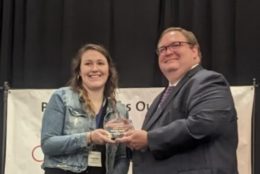
Wright State social work graduate Haleigh Young received the Caseworker of the Year award from Matt Damschroder, director of the Ohio Department of Job and Family Services.
Haleigh Young, a 2021 Wright State University social work graduate, was named the Ohio Caseworker of the Year, and while she was happy and surprised by the honor, she is not going to rest on that laurel.
What drives her is knowing that she has been in similar situations as the teenagers who make up her caseload, and she wants to help them as she wishes she had been helped.
Young, a caseworker for Clark County Job and Family Services, was honored by the Public Children Services Association of Ohio during a statewide social worker conference.
“I had no idea I was getting the award,” she said. “I was surprised that my daughter and my mom and my advocate were all there. My coworkers had the option to tell me, but they kept it as a surprise. I was excited and just really grateful.”
The award presentation said, “This worker goes above and beyond by recognizing milestones and ensuring that her clients know they are cared for. Her clients describe her as the first person who truly listened to them. This worker’s personal experiences have shaped her into a compassionate and effective advocate, not just within her agency but also in the community.”
Young said the Social Work Program at Wright State helped her immensely.
“I learned a lot from the staff,” she said. “Their values and the things they taught me apply a lot to how I practice social work. I went into the job having a good understanding, and the practicum experience helped me build my caseload and not be overwhelmed. I’m thankful for that.”
Young moved from Columbus to Springfield several years ago and transferred to Wright State because it was affordable.
“And as a single mom, I could take classes while I worked. It was a good option,” she said.
As an undergraduate student, Young did her practicum at Clark County Job and Family Services and after graduation started working there as a caseworker.
Young is now an independent-living caseworker, working with boys and girls 14 and older who are in the agency’s custody. The goal is to find them permanent living arrangements and connections with support while also teaching them life skills.
“These children try to cope with past trauma or struggle with substance abuse or have been bounced to a lot of different placements,” Young said. “They’re trying to find stability.”
Young said she loves working with teenagers.
“A lot of them have had a lot of placements, and I’m that one consistent person for them. I get to build a stronger relationship with them that they might not get. I like being able to advocate for them and make sure their voices are heard,” she said.
Young’s empathy for them is derived from her own experiences. She experienced sexual abuse and human trafficking throughout her childhood and into her young adult life.
“I was never in foster care,” Young said, “but I had to go to a child advocacy center, and I had some contact with children services. I can’t go back and change what happened to me or how people responded, but that’s empowering me to make a change for someone else.”
To effect that change, Young plans to apply to law school, taking an entrance exam in November.
“I’m hopeful I can get a law degree and help as an attorney for children’s services,” Young said. “I want to help. I want to be the person who I would’ve needed when I was young.”

 Milling around
Milling around  Wright State recognizes Nursing Professor Kim Ringo for advancing international student success
Wright State recognizes Nursing Professor Kim Ringo for advancing international student success  Wright State honors graduating students for distinguished doctoral dissertations
Wright State honors graduating students for distinguished doctoral dissertations  Top 10 Newsroom videos of 2025
Top 10 Newsroom videos of 2025  Museum-quality replica of historic Hawthorn Hill donated to Wright State
Museum-quality replica of historic Hawthorn Hill donated to Wright State 